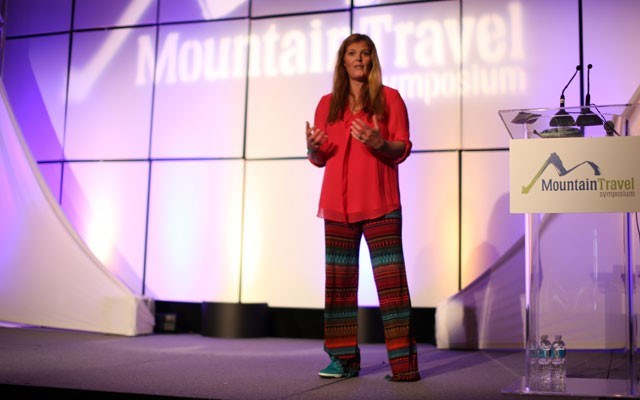Ski racing may be thought of as a staunchly individual sport.
But take it from a legend, it's a team sport through and through.
American skier Picabo Street spoke about the importance of team — and her struggle to settle into one — as she shared anecdotes from her decade-long FIS career at the Mountain Travel Symposium at the Chateau Fairmont Whistler on April 16.
As part of the presentation, the two-time Olympic medallist and two-time world downhill champion described a challenging situation she overcame as a young skier with teammate Hilary Lindh, where both were giving each other the silent treatment as a result of their rivalry, with Street noting she made sure she was on the chairlift when Lindt was taking her run. When they eventually sorted out their differences, Street said Lindt feared coming off as too overbearing and bossy with younger skiers, while those interactions came a lot more naturally to Street.
Street explained coming from Triumph, Idaho, she was the only girl in the ski program and grew up as a bit of a tomboy. She could solve disputes with boys without issue, but acknowledged she had difficulty getting along with other girls.
Street hoped those in attendance took the message to heart, noting though all resorts are up against one another for business, nothing good can come from one undermining another.
"I don't care if you have a minute and a half of racing against each other and you have a separation of three steps on the podium at the end of the day. That's such a small time in life that I had to figure out how to manage this and not want to be done," she said. "I had to turn my blessing and my talent into a job and I had to figure out how to work with the people I was working with, from my coaches to my teammates."
Once that happened, Street and Lindt started watching video together, which she acknowledged was "painful" in the early going. Both eventually benefitted from it, going one-two for the rest of the year, with Street eventually hitting the top of the World Cup podium and her teammate taking second.
"I got addicted to that feeling of having someone up there on the podium with me and having USA represented so profoundly," she explained. "I started working really hard within the team to make that happen. I pulled it off with some people but not so well with others."
Street recalled working with Swedish competitor Pernilla Wiberg on her speed events, as Wiberg took a technical approach to those as well. Street said she promised a podium finish at Cortina d'Ampezzo in 1996, and sure enough, there Wiberg was in second to Street's first.
"If I teach her to be better, then I've got to be better," she said. "That was my way of keeping the fire hot."
Not long after that race, Street blew out her left knee in training, throwing her attendance at the Nagano Games into doubt. By that time, she had reached out to so many fellow racers that she had competitors from eight different countries come as well-wishers to encourage her recovery.
Whistler has popped up at some important junctures in her life, too.
Her first race after winning Olympic silver in 1994 took place here, while she won four races here in early 2001, about a year before she was set to compete as a home Olympian in Utah.
Acknowledging she had struggled with injuries immediately after winning the super-G gold at the Nagano Games in 1998, and had hit the podium just once after returning for the 2000-01 season, Street said her dominant performances in those four Nor-Am Cup races gave her a sense the Olympics on home snow would be worth her while. Her narrowest margin of victory in the five races was 1.51 seconds, and she ultimately placed 16th in the downhill in Utah.
"It was a feather in my cap," she said. "It made me feel like I could win at the Olympics again."
She was set to hit the local slopes again, as after her symposium presentation, she planned to spend two hours skiing with attendees on the hill — not showing off her own skills, but helping out folks who would happily accept a nugget or two of wisdom from a world-class skier.
It's part of a deep-seated desire to give back, which Street recalled was instilled in her 30 years ago. She was the No. 1 skier in the nation, but was almost unable to defend that ranking as her family didn't have the $5,000 to send her to Alyeska Resort in Alaska for the U.S. Junior Olympics. She pounded the pavement, asking for support from businesses in her hometown and raised the funds. The merchants asked for nothing in return ,but for Street to do her best. She won every race she entered.
To this day, she gives back as an advocate for concussion awareness and to support military members.




